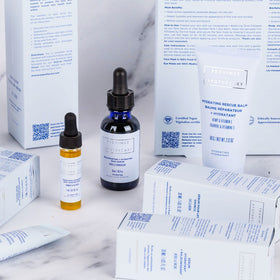Our holistic Approach to Skin Healing
We believe in holistic health; considering all aspects of mind, body and spirit when dealing with concerns and illness. Our approach to skin care is no different! When treating acne, eczema, dermatitis, dehydration, etc.. we must consider our diet, lifestyle, thoughts and emotions as well as what we're putting onto our skin. To some, this may seem like a lot of work. Our modern beauty industry seems to have a 'quick fix' product for everything. But do these expensive, chemical-laden, 20 product skin care regimes actually heal the root cause of our concerns? This is something to consider when dealing with the vitality of our largest organ: our skin.
Our Skin
- covers our entire bodies + delimits what's 'inside' from what's 'outside'
- a protective layer that defines our vital space and allows our inner space to show through
- an extension of our inner sensitivity, our felt experience (ie: sensitive skin reflects a highly sensitive person)
- skin that perspires a lot evacuates the emotions that we hold back and need to release
- a disease that 'touches' my skin indicates that I am experiencing difficulty communicating with others
- eczema/psoriasis may form at the time of a separation or loss of a loved one - it may be manifested through lack of affection, tenderness and touch
- the quality of my relations with the outside world will be represented by the state of my skin
Source: "The Complete Dictionary of Ailments and Diseases" by Jacques Martel.
Our skin is a reflection of our inner worlds. When we get a 'flare up' on our skin, it is a warning sign to a deeper imbalance we're experiencing. Although we often find skin complications annoying or unappealing - it's beneficial to perceive them positively + as a warning sign, as they possess information that's often concealed in our deeper layers.
Our skin is a reflection of our inner worlds. When we get a 'flare up' on our skin, it is a warning sign to a deeper imbalance we're experiencing. Although we often find skin complications annoying or unappealing - it's beneficial to perceive them positively + as a warning sign, as they possess information that's often concealed in our deeper layers.
Take note of your small irritations that surface on the skin, and you can work with us to heal the root cause of your pain. We believe this to be the most sustainable method of healing!
Food Journal
A food journal is essentially a record of all your meals and corresponding meal times. This will help correlate certain skin concerns with your dietary intolerances, as you'll start to notice the similarities between food consumption and skin flare-ups.
Food Journal
A food journal is essentially a record of all your meals and corresponding meal times. This will help correlate certain skin concerns with your dietary intolerances, as you'll start to notice the similarities between food consumption and skin flare-ups.
*example Monday June 1
8-9am, at home | Blueberry, Blackberry, Raspberry, Banana, Almond Smoothie with Flax, Chia and Hemp seeds
11am, at work | Iced Coffee (black) with Cheese Croissant
*feeling energized!
1-2pm, at work | Ham sandwich with lettuce, tomato, cucumber, red pepper, carrot and hummus on sourdough bread
*feeling a bit tired after lunch
*feeling a bit tired after lunch
Be quite descriptive with your journal notes. List every ingredient (if possible) in your food journal so that you can decisively pinpoint trigger foods. Record your mood/energy levels each day, any exercise you've done that day, where you are eating your meals, your stress levels, and anything else you think is important to note.
"Our skin specifically responds to elevated cortisol and the 'stress-response'. As a holistic practitioner, I consider this as a major potential contributing factor along with food (and hydration)." - Danielle Levy, RHN
"Our skin specifically responds to elevated cortisol and the 'stress-response'. As a holistic practitioner, I consider this as a major potential contributing factor along with food (and hydration)." - Danielle Levy, RHN
When you start to notice a concern arising, or if you're trying to reverse a current concern, check in with your journal and see if there have been any dietary changes lately. Is there enough variety in your diet? Our bodies need a wide variety of vitamins and minerals for optimal health. Are you consuming a lot of the same food each day? Sometimes are bodies can develop intolerances due to overconsumption.
Once you have a good sense of the foods that may be irritating you, you can start on an Elimination Diet.
Elimination Diet
An elimination diet consists of removing trigger foods from your diet slowly + mindfully, to see if your skin concern will start to clear up. A common list of trigger foods are: dairy, red meat, sugar, highly processed foods, yeast, gluten, and nuts. Once your skin concerns heal, you may slowly introduce these foods back into your diet in hopes of pinpointing a specific allergen. In most cases, people will not want to divert back to their once troublesome diet.
"When performing the elimination diet, it is important to continue keeping the Food Journal, to be documenting the changes that one notices. If deciding to get the help of a nutrition professional like myself, having this documentation is also incredibly helpful - as I can analyze the data further and help them along more affectively with the process.
For example, if a client does notice that dairy is inflammatory for them, I provide healthy whole-food replacements that they can begin using in their meals, so that they don't 'miss' the food or food group as much." - Danielle Levy, RHN
An elimination diet consists of removing trigger foods from your diet slowly + mindfully, to see if your skin concern will start to clear up. A common list of trigger foods are: dairy, red meat, sugar, highly processed foods, yeast, gluten, and nuts. Once your skin concerns heal, you may slowly introduce these foods back into your diet in hopes of pinpointing a specific allergen. In most cases, people will not want to divert back to their once troublesome diet.
"When performing the elimination diet, it is important to continue keeping the Food Journal, to be documenting the changes that one notices. If deciding to get the help of a nutrition professional like myself, having this documentation is also incredibly helpful - as I can analyze the data further and help them along more affectively with the process.
For example, if a client does notice that dairy is inflammatory for them, I provide healthy whole-food replacements that they can begin using in their meals, so that they don't 'miss' the food or food group as much." - Danielle Levy, RHN
Being self aware and in control of your own body is such an empowering feeling.
xx Cassandra




